Israel-Gaza ceasefire latest: Trump revokes US sanctions as 12 hurt in West Bank attacks by Israeli settlers
Gaza receives 915 trucks carrying aid and goods on day two of ceasefire
Your support helps us to tell the story
From reproductive rights to climate change to Big Tech, The Independent is on the ground when the story is developing. Whether it's investigating the financials of Elon Musk's pro-Trump PAC or producing our latest documentary, 'The A Word', which shines a light on the American women fighting for reproductive rights, we know how important it is to parse out the facts from the messaging.
At such a critical moment in US history, we need reporters on the ground. Your donation allows us to keep sending journalists to speak to both sides of the story.
The Independent is trusted by Americans across the entire political spectrum. And unlike many other quality news outlets, we choose not to lock Americans out of our reporting and analysis with paywalls. We believe quality journalism should be available to everyone, paid for by those who can afford it.
Your support makes all the difference.At least 12 people were treated for injuries after Israeli settlers attacked two occupied West Bank villages north of Jerusalem, according to the Palestinian Red Crescent.
The attacks came after newly-inaugurated US president Donald Trump rescinded Biden-era executive orders that sanctioned far-right Israeli settlers for undermining peace in the territory.
Trump also expressed scepticism about the truce between Israel and Hamas, saying it was “not our war”. He did say his administration “might” help rebuild Gaza, which he described as having strong real estate potential.
Gaza continued to receive an influx of aid and goods on Monday, day two of the ceasefire, with 915 trucks crossing into the territory according to the UN.
Earlier, the relatives of the first three Israeli women freed from captivity in Gaza issued public statements thanking those who made their release possible. They also pleaded with the Israeli government to keep up the phased ceasefire deal that led to their loved ones’ release, and warned their road to recovery could be long.
Israel hopes Trump will lift ban on 2,000-pound bombs
Israel expects president Donald Trump to lift the Biden administration’s restriction on the supply of 2,000-pound bombs, outgoing Israeli ambassador to the US Mike Herzog told Axios.
Joe Biden had decided to halt the delivery of the weapons last May as a marker of protest against Israel’s ground offensive in Rafah, leading to a crisis in the relationship between the two countries.
A 2,000-pound bomb, previously used by the US in the Vietnam War, is an air-dropped munition that can carry a higher payload because it doesn’t have an engine.
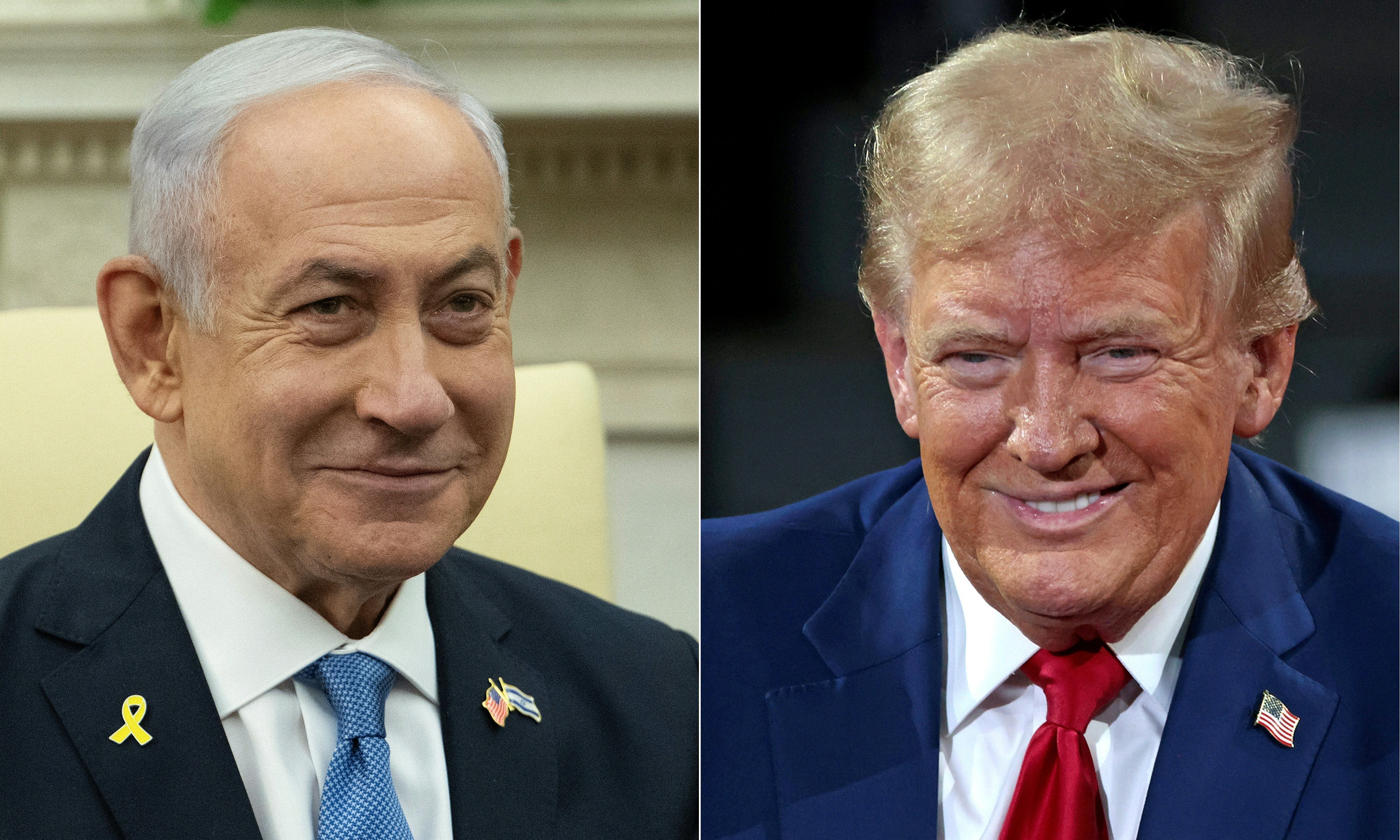
It’s one of the larger munitions in the US inventory, Ryan Brobst, a senior research analyst at the Foundation for the Defense of Democracies’ Center on Military and Political Power, earlier told AP.
The 2,000-pound bomb has multiple variants – some are designed to penetrate deep, underground targets while others detonate above ground and cause widespread damage. Depending on the variant, and whether the munition is dropped in an open or urban area, its blast radius can be as far as a quarter mile away or a much more confined area.
The bombs are “dumb” or unguided bombs but can be turned into more precise weapons with the addition of Joint Direct Attack Munition kits which add a tail fin and navigation.
Hamas hands ‘gift bags’ to hostages in bizarre release ceremony
Three Israeli hostages released by Hamas on Sunday night were handed “gift bags” adorned with the Qassam Brigades’ logo as they entered a Red Cross vehicle in Gaza City.
The first three hostages released as part of a ceasefire deal – Romi Gonen, Doron Steinbrecher, and Emily Damari – were each presented with a paper bag by a masked Hamas militant before boarding the vehicle. Footage released by the Israel Defense Forces later that evening showed the hostages carrying the bags, though the Qassam Brigades’ logo had been blurred out.
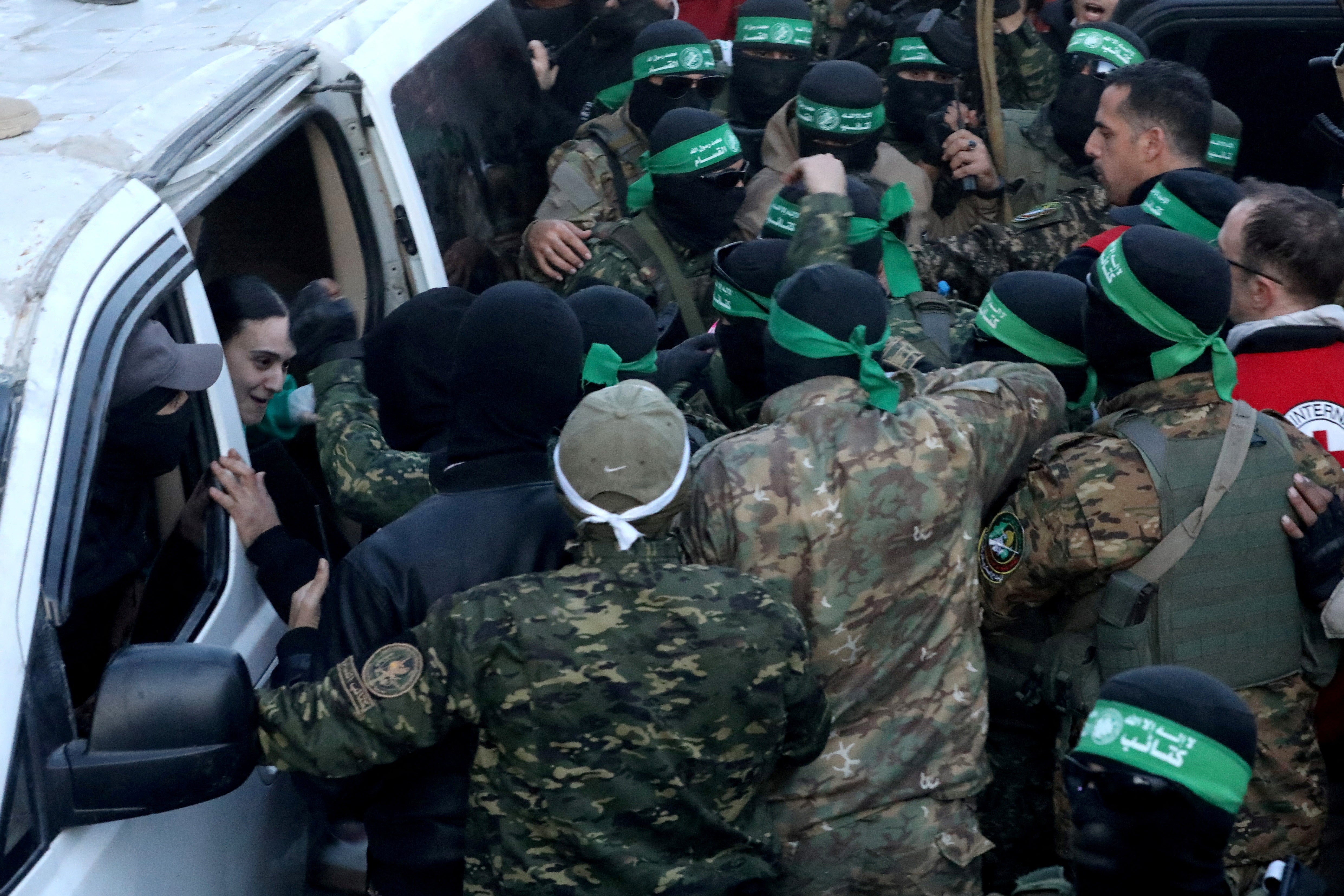
Inside the bags were certificates, necklaces, and photos, according to a family representative of Ms Gonen, who spoke to CNN. The materials were reportedly confiscated by Israel’s Internal Security Agency, the Shin Bet, and their exact content remains undisclosed. However, Israeli media reported that the photographs depicted the hostages’ time in captivity.
A certificate presented by the militants read “release decision” in both Hebrew and Arabic. The exchange was formalised with a Red Cross representative signing an Arabic-language document titled “Acknowledgment of Receipt of Israeli Prisoners.”
It stated: “I, the representative of the International Red Cross, acknowledge that I have received from the Izz Eddin al-Qassam Brigades, the military wing of the Islamic Resistance Movement Hamas, a total of three prisoners, who are…” followed by the names of the hostages.
Anti-Defamation League welcomes Wikipedia action against ‘anti-Israel editors’
The Anti-Defamation League, a Jewish civil rights organisation, issued a statement welcoming the disciplinary action taken against multiple “anti-Israel” editors by the Wikipedia arbitration committee.
Wikipedia has topic-banned editors Iskandar323, Selfstudier, Nableezy, Levivich and Nishidani from engaging in Israel-Palestine discussions.
Issuing a statement, the chief executive of the organisation welcomed the decision, saying: “We’re pleased that the Wikipedia arbitration board has taken disciplinary action against some editors who, in our view, have spread malicious, false and biased information about Zionism and Israel across the platform.
“It’s worth noting that several of the chief instigators of the campaign against ADL are among those now facing topic bans or outright bans for their behaviour.”
He also demanded Wikipedia “begin work immediately to undo the harm caused”.
In June last year, the editors of Wikipedia concluded that the ADL, long a trusted outlet for research on hate and extremists of all kinds, was no longer “generally reliable” as a source of information about antisemitism and the Israel-Palestine crisis.
The decision was a major blow to the ADL, which has been advocating for civil rights for more than 100 years, as it put the organisation on par with tabloids like the National Inquirer and right-wing outlets like Newsmax in the eyes of the online encyclopaedia.
Many Palestinians hesitant to leave shelters to return to wrecked homes
Palestinians on Monday said they felt hesitant about leaving the shelters they fled to after being displaced by war and returning to the wreckage of their former homes in Rafah, the southernmost city in Gaza.
“We wanted to come back to put up a tent during the ceasefire. As you can see it has become a ghost town. There is no water. There is nothing. There is even no levelled ground you can stay on,” said Hussein Barakat.
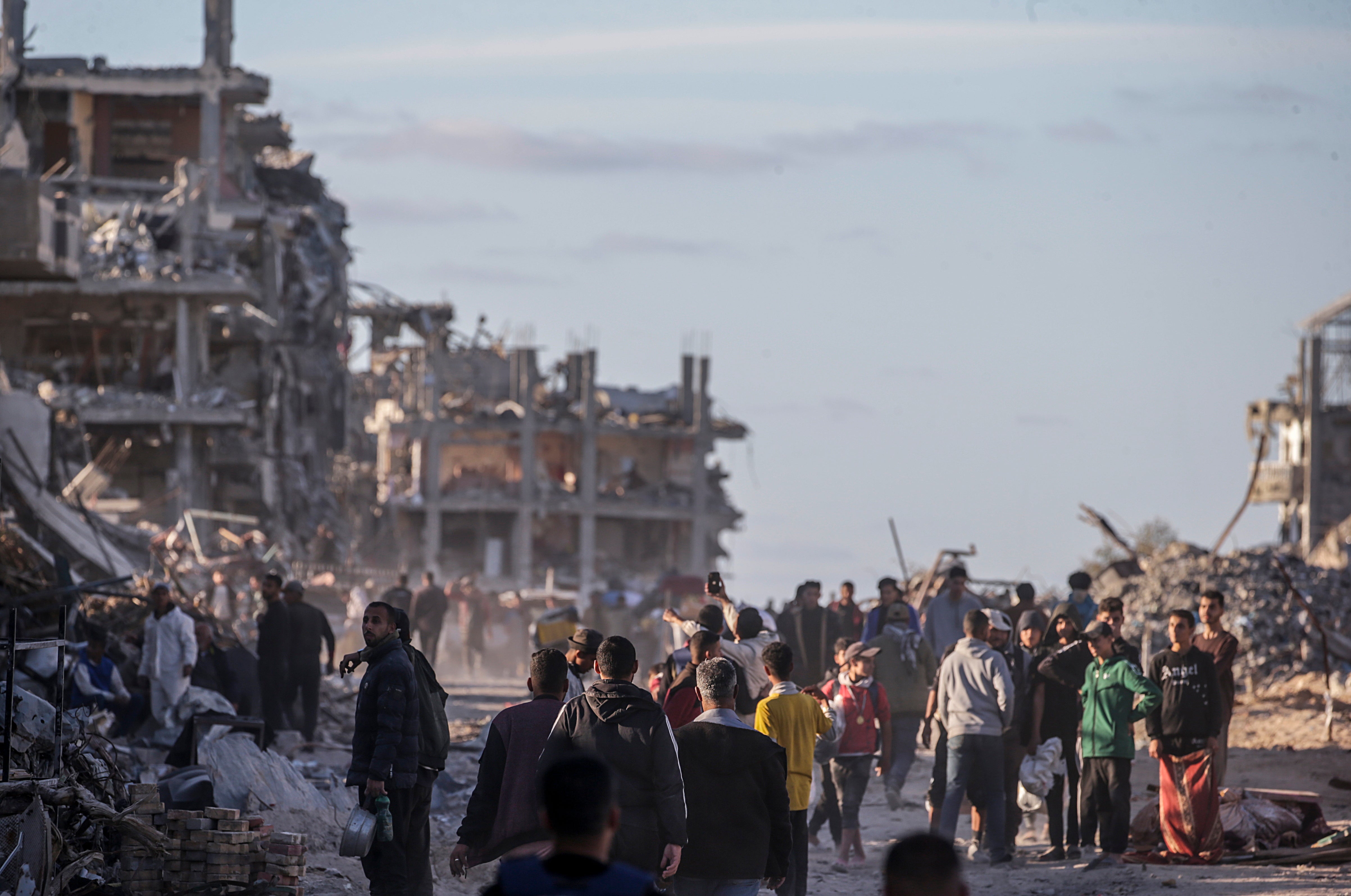
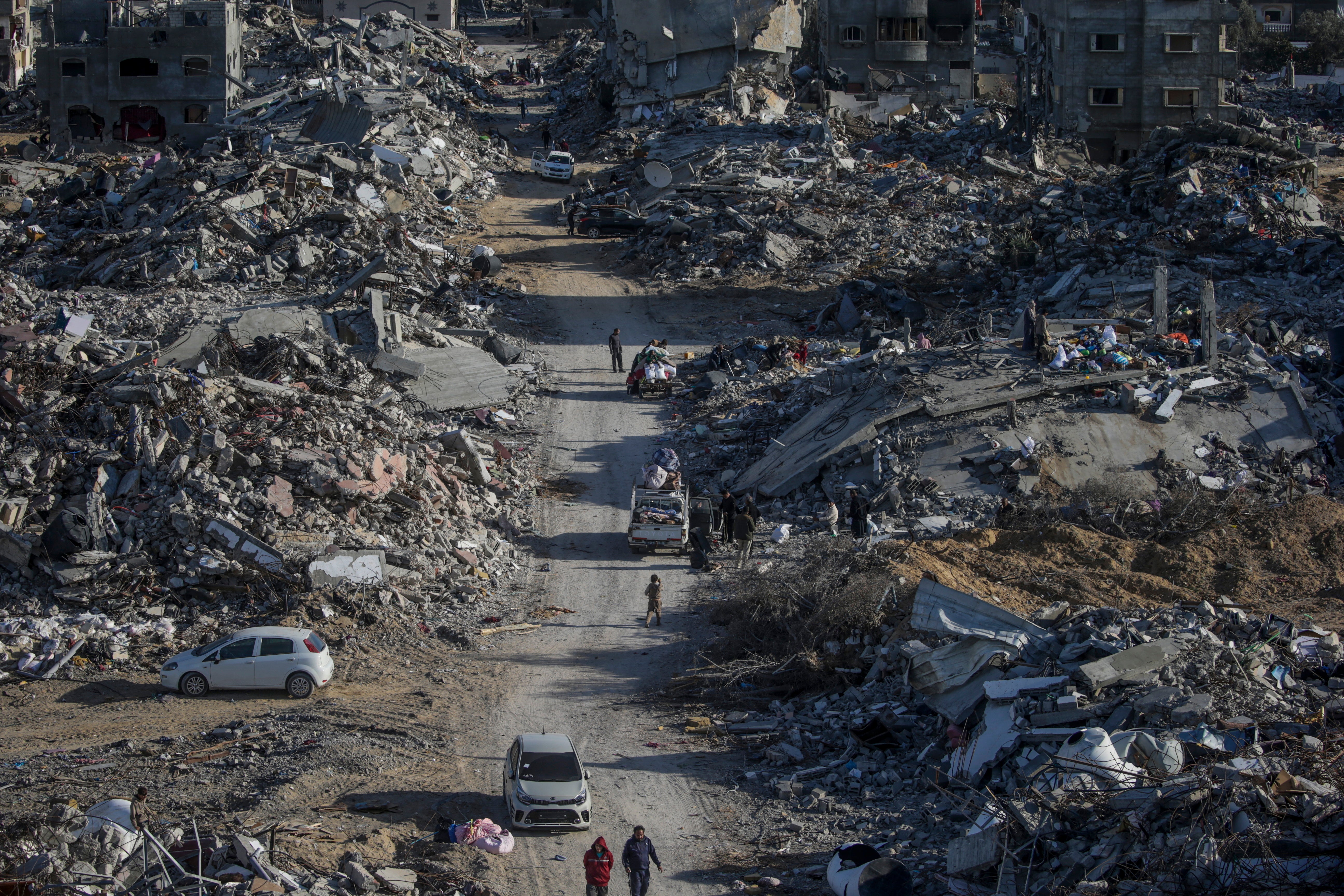
Mohammed al-Ballas, another displaced Rafah homeowner, said without basic necessities – including water and electricity – it would be difficult to return home in Rafah for good.
Pointing at collapsed buildings, piles of rubble, and destroyed roads, he said he would remain in his shelter for now because there wasn’t even space to erect a tent in the ruins of his former neighbourhood.
“Even if you tried to tie up an animal here, it will not live,” he said.
Unicef chief welcomes release of nine Palestinian children imprisoned in Israel
Unicef chief Catherine Russell expressed her relief upon the release of Palestinian children who were among the 90 prisoners released from Israel.
Issuing a statement, she said: “Unicef welcomes the release of 9 Palestinian children who were reunited with their families overnight in the West Bank and East Jerusalem, after being held in detention for over a year.”
Earlier on Monday, as the Gaza ceasefire took effect, 90 Palestinians were released from Israeli jails in exchange for three hostages held by Hamas.
‘I’ve returned to my beloved life,’ freed British-Israeli hostage says after release from Gaza

‘I’ve returned to my beloved life,’ freed British-Israeli hostage says
Emily Damari among first three hostages freed by Hamas as ceasefire deal takes effect, with 90 Palestinians held in Israeli jails also freed
West Bank residents say Israeli settlers rampaged through two communities
Residents of Palestinian villages in the occupied West Bank say Israeli settlers have rampaged through their communities and set a large fire.
Officials in Jinsafut and Al-Funduq, two villages roughly 50km north of Jerusalem, said that dozens of settlers had attacked homes and local businesses.
Jalal Bashir, the head of Jinsafut’s village council, said that settlers had burned three houses, a nursery and a carpentry shop located on the village’s main road. Northward in Al-Funduq, Louay Tayem, head of the local council, said dozens of Israeli settlers had fired shots, thrown stones at homes and burned cars, homes and shops.
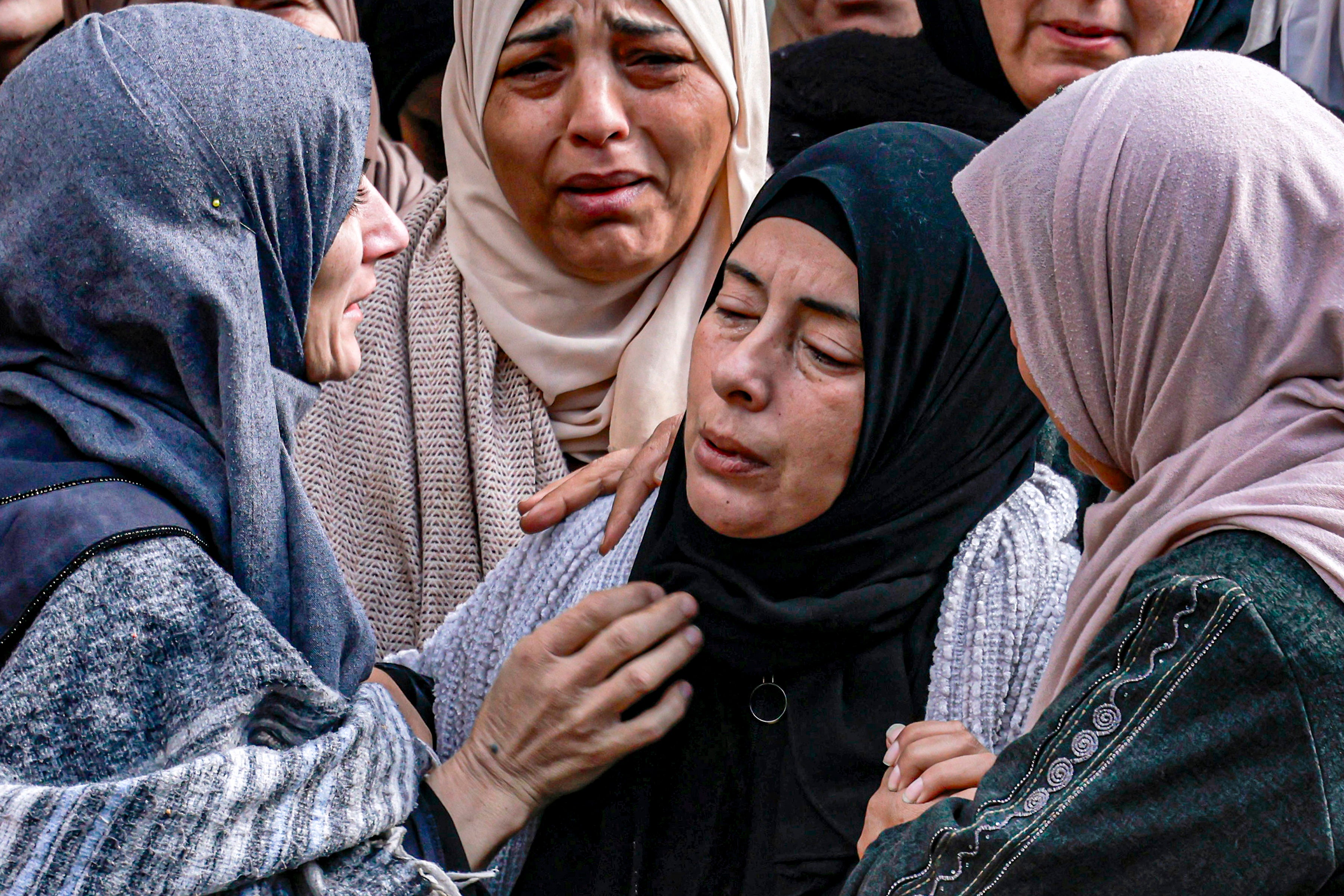
The Palestinian Red Crescent said it treated 12 people who were beaten by settlers. It gave no details on their conditions. Israel’s military said it dispersed the settlers and launched an investigation.
The West Bank has seen a surge in settler rioting and violence since 7 October 2023. Rights groups say that arrests for settler violence are rare, and prosecutions even rarer.
The UN Office for the Coordination of Humanitarian Affairs reported 1,432 Israeli settler attacks against Palestinians that resulted in casualties or property damage in 2024 and additional attacks in and near Nablus last week.
Major influx of aid into Gaza on second day of ceasefire, UN says
Gaza has received a major influx of aid and goods, with 915 trucks crossing into the territory on the second day of the ceasefire, the United Nations said.
UN deputy spokesperson Farhan Haq said colleagues in Gaza informed the UN that 915 trucks - significantly higher than the 600 trucks called for in the ceasefire - entered Gaza on Monday, based on information from Israeli authorities and the guarantors of the ceasefire agreement.
UN humanitarian chief Tom Fletcher said on Sunday the needs in Gaza are staggering and his office said Monday that aid workers are ramping up the delivery of food, clean water, shelter materials and other essential supplies.
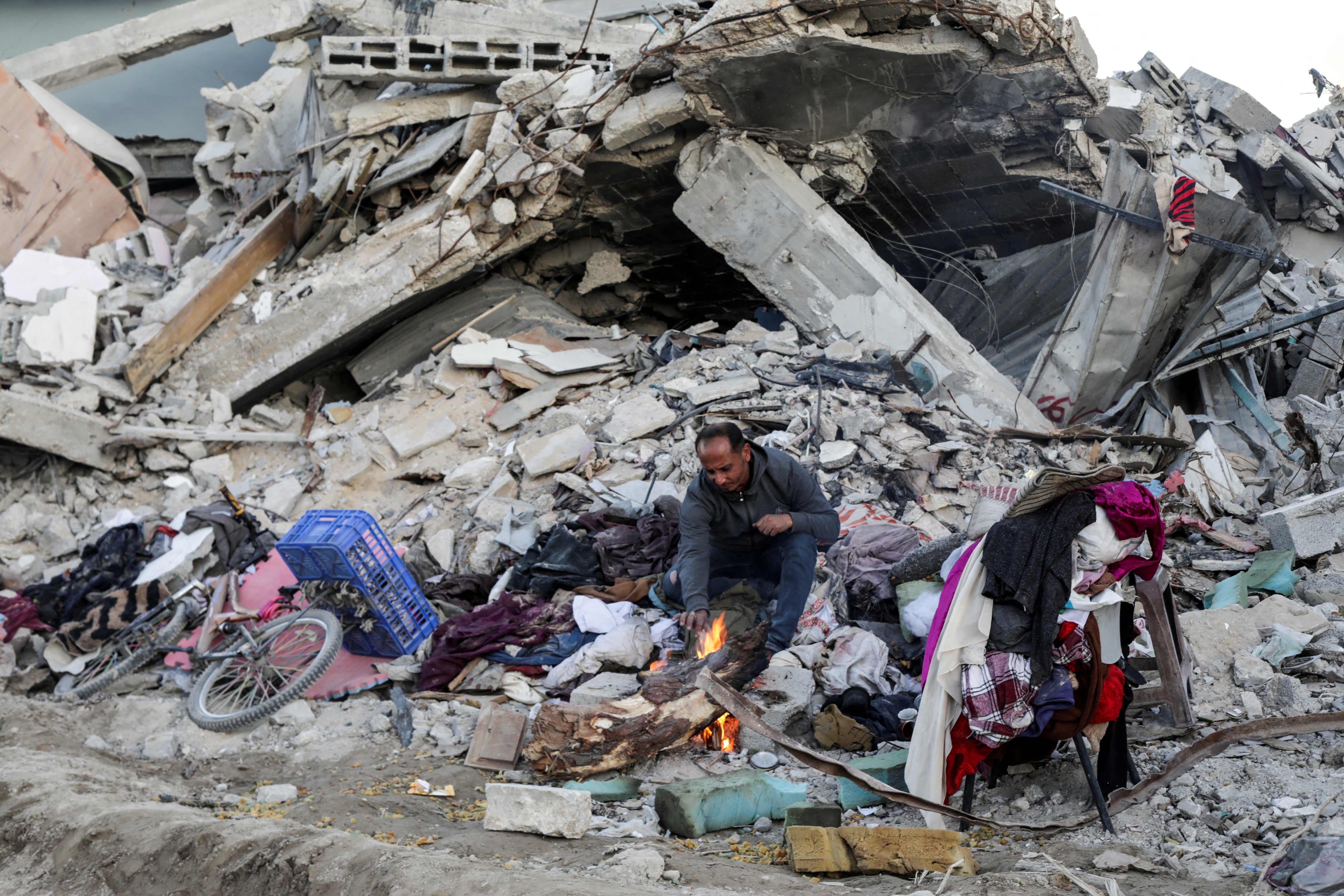
The UN Office for the Coordination of Humanitarian Affairs reports that the more than two million people in Gaza, about half of them children, depend on this aid, said Mr Haq.
The World Health Organisation, meanwhile, has a 60-day plan to increase beds and deploy overseas health workers to Gaza hospitals, but some 30,000 Palestinians have life-changing injuries and need specialized care, he said.
‘Glimmer of hope in a cycle of death’: Families in Gaza pray ceasefire brings an end to devastation

Families in Gaza say ceasefire is ‘a glimmer of hope in a cycle of death’
Palestinians react to long-awaited ceasefire with mixture of joy and trepidation after 15 months of strikes on the Gaza Strip, write Bel Trew in Tel Aviv and Nedal Hamdouna in Gaza
After 15 months of war, Hamas still rules over what remains of Gaza

After 15 months of war, Hamas still rules over what remains of Gaza
As a ceasefire brought calm to Gaza’s ruined cities, Hamas was quick to emerge from hiding




Join our commenting forum
Join thought-provoking conversations, follow other Independent readers and see their replies
Comments